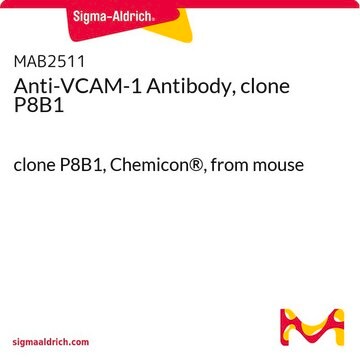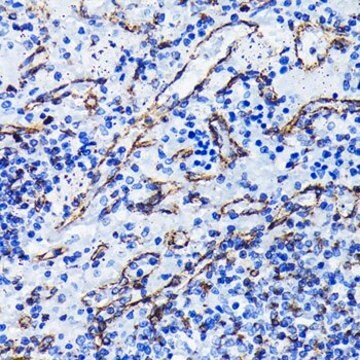ZRB2284
Anti-PAI-1 Antibody, clone 1C11 ZooMAb® Rabbit Monoclonal

recombinant, expressed in HEK 293 cells
Synonyme(s) :
Endothelial plasminogen activator inhibitor, PAI, Plasminogen activator inhibitor 1, Serpin E
About This Item
Produits recommandés
Source biologique
rabbit
Niveau de qualité
Produit recombinant
expressed in HEK 293 cells
Conjugué
unconjugated
Forme d'anticorps
purified antibody
Type de produit anticorps
primary antibodies
Clone
1C11, recombinant monoclonal
Description
recombinant, expressed in HEK 293 cells
Gamme de produits
ZooMAb® learn more
Forme
lyophilized
Poids mol.
calculated mol wt 45.06 kDa
observed mol wt ~45 kDa
Produit purifié par
using Protein A
Espèces réactives
mouse, human
Conditionnement
antibody small pack of 25 μL
Caractéristiques du produit alternatif plus écologique
Waste Prevention
Designing Safer Chemicals
Design for Energy Efficiency
Learn more about the Principles of Green Chemistry.
Validation améliorée
recombinant expression
Learn more about Antibody Enhanced Validation
sustainability
Greener Alternative Product
Technique(s)
affinity binding assay: suitable
immunocytochemistry: suitable
immunohistochemistry: suitable
western blot: suitable
Isotype
IgG
Séquence de l'épitope
N-terminal half
Numéro d'accès Protein ID
Numéro d'accès UniProt
Conditions d'expédition
ambient
Température de stockage
2-8°C
Informations sur le gène
human ... PAI1(5054)
Description générale
Spécificité
Immunogène
Application
Evaluated by Western Blotting in Human umbilical vein endothelial cells (HUVEC) lysate.
Western Blotting Analysis: A 1:10,000 dilution of this antibody detected PAI-1 in Human umbilical vein endothelial cells (HUVEC) lysate.
Tested Applications
Western Blotting Analysis: A 1:1,000 dilution from a representative lot detected PAI-1 in lysate from U2OS cells and 1:10,000 dilution in Mouse placenta tissue lysate.
Affinity Binding Assay: A representative lot of this antibody bound PAI-1 peptide with a KD of 5.8 x 10-8 in an affinity binding assay.
Immunocytochemistry Analysis: A 1:100 dilution from a representative lot detected PAI-1 in Human umbilical vein endothelial cells (HUVEC).
Immunohistochemistry (Paraffin) Analysis: A 1:100 dilution from a representative lot detected PAI-1 in Human placenta tissue sections.
Note: Actual optimal working dilutions must be determined by end user as specimens, and experimental conditions may vary with the end user.
Description de la cible
Forme physique
Reconstitution
Stockage et stabilité
Informations légales
Clause de non-responsabilité
Vous ne trouvez pas le bon produit ?
Essayez notre Outil de sélection de produits.
Code de la classe de stockage
11 - Combustible Solids
Classe de danger pour l'eau (WGK)
WGK 1
Point d'éclair (°F)
Not applicable
Point d'éclair (°C)
Not applicable
Certificats d'analyse (COA)
Recherchez un Certificats d'analyse (COA) en saisissant le numéro de lot du produit. Les numéros de lot figurent sur l'étiquette du produit après les mots "Lot" ou "Batch".
Déjà en possession de ce produit ?
Retrouvez la documentation relative aux produits que vous avez récemment achetés dans la Bibliothèque de documents.
Notre équipe de scientifiques dispose d'une expérience dans tous les secteurs de la recherche, notamment en sciences de la vie, science des matériaux, synthèse chimique, chromatographie, analyse et dans de nombreux autres domaines..
Contacter notre Service technique


![Anti-CD62E [ELAM-1] Antibody, clone 1.2B6 clone 1.2B6, from mouse](/deepweb/assets/sigmaaldrich/product/images/224/939/8a711839-25ef-4e45-badd-208503950c8a/640/8a711839-25ef-4e45-badd-208503950c8a.jpg)

